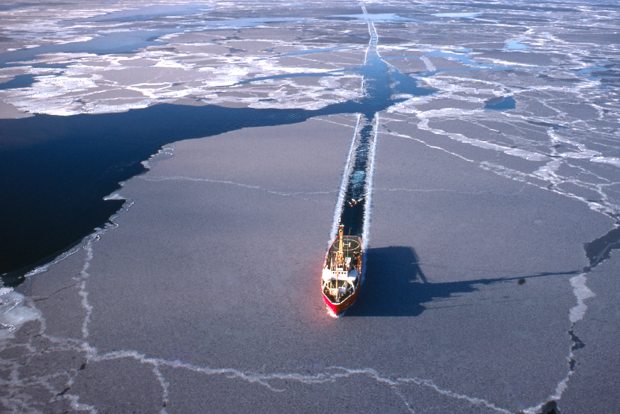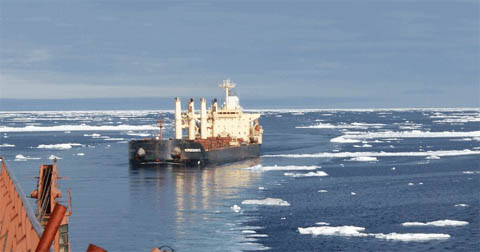|
|
|
|
|
|
|
|
Marine Mammal Commission Arctic Listening Sessions, February 11, 2016 (Anchorage, Alaska, USA). The Arctic is changing faster than anywhere else on earth. How is climate change impacting the Arctic marine environment and subsistence hunting of marine mammals by Alaska Native communities? We will focus on these questions at a series of listening sessions in Alaska in early February. Our goal is to gain a better understanding of how climate change is impacting Alaska Native communities and the marine mammals upon which they depend, and hear your ideas on actions that can be taken in response.
Alaska Forum on the Environment, February 8-12, 2016 (Anchorage, Alaska, USA). The Alaska Forum on the Environment (AFE) is Alaska's largest statewide gathering of environmental professionals from government agencies, non-profit and for-profit businesses, community leaders, Alaskan youth, conservationists, biologists and community elders. The diversity of attendees and comprehensive agenda sets this conference apart from any other. Each year there are over 80 technical breakout sessions and Keynote Events. There will be a full week of sessions on climate change, energy, environmental regulations, cleanup and remediation, fish & wildlife, solid waste, and more.
Today's Congressional Action:
The House and Senate are in session and expected to consider non-Arctic legislation.
|
 Obama's Budget Shows Alaska's on the President's Mind. Obama's Budget Shows Alaska's on the President's Mind. President Barack Obama's latest budget request, out today, will pay homage to Alaska on its cover, with a photo of Denali, and several budget priorities aimed at the state. Many in the state have been awaiting the fiscal year 2017 budget request to see just how the administration plans to carry out many of the promises made during Obama's trip to Alaska, including advancing funding for new icebreakers. There's no billion-dollar line item, but the administration did include funding to push the acquisition process forward. Alaska Dispatch News
Russia's Bid for Arctic Shelf Border Expansion in Facts. The 40th session of the UN Commission on the Limits of the Continental Shelf (CLCS) is taking place from February 1 to March 18. Russian Natural Resources and Environment Minister Sergei Donskoi is due to present the country's claim to extend its rights in the Arctic continental shelf in New York later in the day. In early August 2015, Russia submitted a partially revised application to the United Nations seeking to enlarge its continental shelf limits in the Arctic Ocean. The application included Russia's scientifically substantiated claim for expanding the shelf area in the Murmansk-North Pole-Chukotka triangle. Sputnik International
 Arctic Shipping Route Not Till 2035 at the Earliest Says Arctic Institute. Arctic Shipping Route Not Till 2035 at the Earliest Says Arctic Institute. According to the Arctic Institute, an Arctic shipping route will not be fully commercially viable until 2035 at the earliest. It will be about two decades before we see a lot of traffic along that route. An Arctic shipping route gives sea vessels an alternative to the Suez Canal, for example. Exporters shipping from China to Europe can deliver their merchandise more cheaply and faster. A new study on the commercial opportunities and problems of Arctic shipping by a team of researchers at the Maritime Division at the Copenhagen Business School, found that the shipping season on the NSR (Northern Sea Route) will be too short for investments in ice-class vessels to be commercially viable before 2035. Market Business News
 Dragon + Bear: China Seeks Russia's Help in Mastering Arctic, Set Sights on Antarctic. Dragon + Bear: China Seeks Russia's Help in Mastering Arctic, Set Sights on Antarctic. China wants to arrange a joint Arctic expedition with Russia, while deep-sea mining and a deep-sea space station in Antarctica are also on the Beijing agenda, according to the Chinese State Oceanic Administration. The State Oceanic Administration (SOA) wants to establish an air service team, which will allow for greater exploration of Antarctica, according to Xinhua. Given the harsh environment they will be working in, the Chinese scientists understand they will need to adapt their technology and equipment to be compatible with their surroundings. RT News
How Much Arctic Ice Can we Afford to Lose Before It All Goes Down? The melting of ice can have dramatic consequences on the entire planet. It cannot only raise sea levels, but also change marine currents and affect global climate. We know that the floating portion of the ice shelves supports the portion that lies on land, preventing it from flowing into the ocean. If that portion were to flow freely into the ocean, the effects would be drastic. Johannes Fürst from the University of Grenoble in France wanted to see how interconnected Arctic ice is - that is, how much we can afford to lose before the massive grounded chunks flow into the ocean as well. ZME Science
|
Legislative Action
No Arctic legislation was formally considered yesterday.
|
|
Future Events
ARCUS DC Arctic Research Seminar Series, February 18, 2016 (Washington, DC). Does it seem as though the weather gods have gone crazy lately? It is not your imagination. The question on everyone's minds is why? And is it related to climate change? In this presentation, I will explain new research that links increasing extreme weather events with the rapidly warming and melting Arctic during recent decades. Evidence suggests that Arctic warming is causing weather patterns to become more persistent, which can lead to extremes such as droughts, cold spells, heat waves, and some flooding events.
5th Annual Fletcher Opening Arctic Conference, March 12, 2016. The Opening Arctic Conference builds on the Fletcher School's Warming Arctic International Inquiry series, to bring together high-level thought leaders from across disciplines, Fletcher's hallmark. Staged annually, Fletcher's event continues to address the foreign policy, economic, environmental and security implications of the opening Arctic, while dispelling myths.
15th Annual Arctic Health Science Seminar, April 1, 2016 (Anchorage, Alaska, USA). The American Society for Circumpolar Health will host the 15th Annual Arctic Health Science Seminar in Anchorage, Alaska. This event will include the annual meeting of the American Society for Circumpolar Health, the Robert Fortuine Memorial lecture, and the Albrecht Milan Foundation will provide the Albrecht-Milan Emerging Professional Award to one of the Arctic Health Science Seminar presenters. The call for abstracts is open through Monday February 29, 2016.
** New this week** The American Arctic: The United States as an Arctic Power in Science, Technology and Security, April 4, 2016 (San Francisco, CA, USA). The Association of American Geographers will host a panel discussion on the American Arctic. In 2015 the United States assumed the chairmanship of the Arctic Council. In recent years, the Federal government began to pay closer attention to the Arctic owing to dramatic environmental and social changes and growing economic interest in the region's vast resources. President Obama became the first sitting US President to visit the Arctic this August. US Arctic Research Commission Chair Fran Ulmer is expected to be a panelist.
Alaska Rural Energy Conference, April 26-28, 2016 (Fairbanks, Alaska, USA). The Alaska Rural Energy Conference is a three day event offering a large variety of technical sessions covering new and ongoing energy projects in Alaska, as well as new technologies and needs for Alaska's remote communities. Building on the growing success, the Alaska Energy Authority and the Alaska Center for Energy and Power have joined forces again to organize and sponsor the 10th annual Alaska Rural Energy Conference.
14th IATS Seminar, June 19-25, 2016 (Bergen, Norway). The University of Bergen (UiB) is honored to host the 14th IATS Seminar in Bergen, Norway, from Sunday 19 to Saturday 25 June 2016 in co-operation with the Network for University Co-operation Tibet-Norway, an academic network with the universities of Oslo, Bergen and Tromsø as partners. The convenor is Professor Hanna Havnevik, Department of Culture Studies and Oriental Languages, University of Oslo, and Chair of the Network.
Inuit traditions are a repository of Inuit culture and a primary expression of Inuit identity. The theme for the 2016 Inuit Studies Conference invites Elders, knowledge-bearers, researchers, artists, policy-makers, students and others to engage in conversations about the many ways in which traditions shape understanding, while registering social and cultural change. The institutional hosts of "Inuit Traditions," Memorial University of Newfoundland and the Nunatsiavut Government, invite you to contribute to an exchange of knowledge to be held in St. John's, Newfoundland and Labrador, October 7-10, 2016. Presentations on all aspects of Inuit studies will be welcome.
|
|

  
4350 N. Fairfax Drive, Suite 510
Arlington, VA 22203, USA
External links in this publication, and on the USARC's World Wide Web site ( www.arctic.gov) do not constitute endorsement by the US Arctic Research Commission of external Web sites or the information, products or services contained therein. For other than authorized activities, the USARC does not exercise any editorial control over the information you may find at these locations. These links are provided consistent with the stated purpose of this newsletter and the USARC Web site.
|
|
|
|
|
|
|
|
|